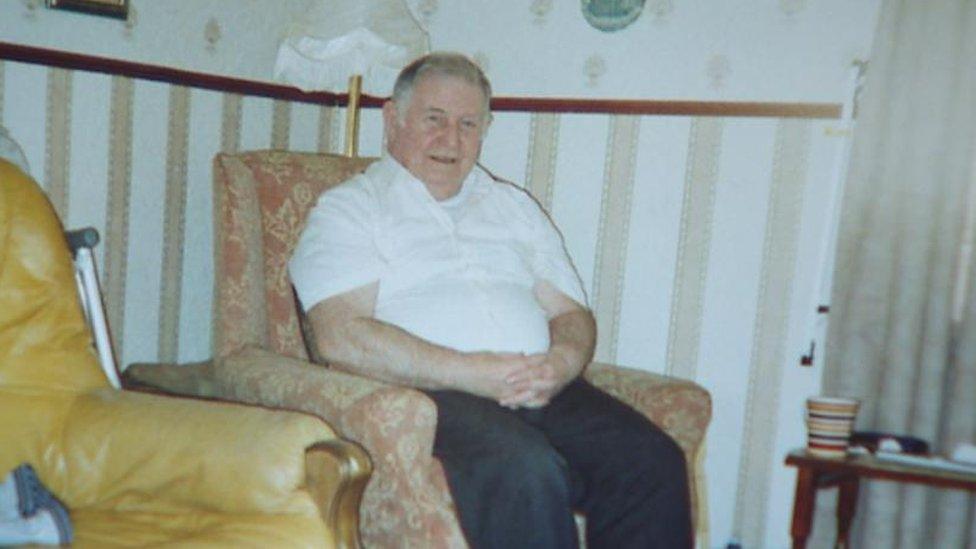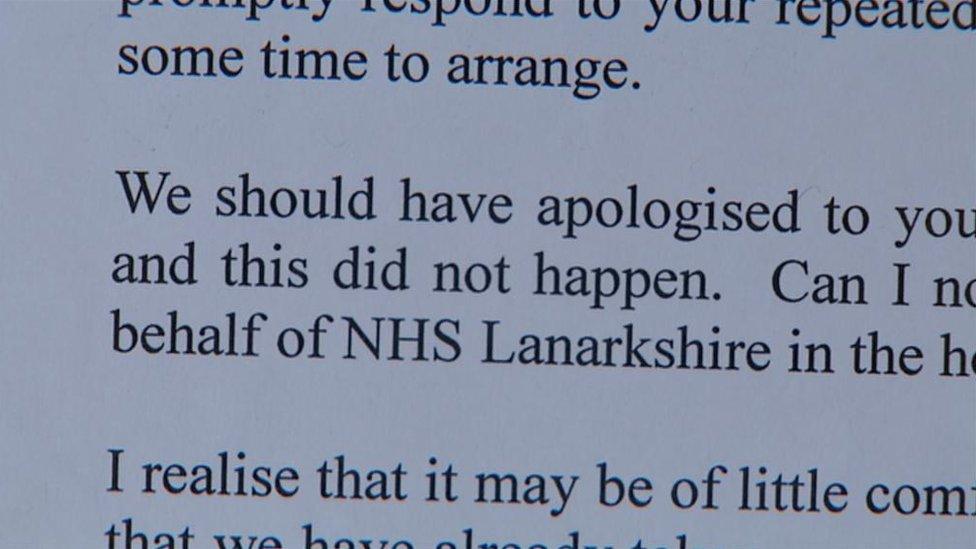Call for action over NHS scan results
- Published

James Docherty only discovered he had terminal cancer when his relatives told his GP he had not received his scan results
Relatives of a man who was not told for more than a year he had terminal cancer have called for action to stop people waiting too long for test results.
A scan revealed in 2012 that James Docherty had terminal cancer.
But he was not told until 2013 after his family informed his GP he was still awaiting test results. He died in August 2014.
The Scottish government said it was considering introducing a deadline for patients to be given scan results.
In 2009 ministers set a target that no-one should wait more than six weeks for key diagnostic tests to be performed.
However, in June of this year, 6,448 people had waited longer, a figure that has risen four-fold in just two years.
While there is a target for receiving tests, there is no similar target for analysing them and telling people the results.
Mr Docherty's daughter, Catherine Oliphant, said her father, who was from Airdrie, had a lesion in his liver which nobody had told him about.
She added: "There was no follow up, nothing. It was progressive, aggressive cancer. If he had known sooner, would it have been operable? Would he have had longer with chemotherapy? We're never going to know."

NHS Lanarkshire has apologised to Mr Docherty's family
The Royal College of Radiologists says waits have risen because its workload is "unsustainable".
Consultant radiologist Grant Baxter said: "We are very much a specialty under pressure. We want to have the best environment for patients but we can't do that on current numbers.
"For a country the size of Scotland we have half the radiologists per head of population compared to the rest of the western world. We need to increase these numbers. Radiology and imaging is at the beginning of a process and without it, other treatment can't go ahead."
In June, more than 60,000 people were waiting for key diagnostic tests, which include radiology, ultrasound, MRI and CT scans, and endoscopies. They are essential to diagnose serious illness including cancer.
Last month the Scottish Public Services Ombudsman strongly criticised NHS Lanarkshire for failing to tell Mr Docherty the results of his scan.
'Lifesaving procedure'
NHS Lanarkshire apologised to Mr Docherty's family and said it would ensure action was taken to address the issues raised.
The Royal College of Radiologists says the workload of radiology departments has risen by 11-13% every year but this has not been matched by an increase in staff. It says 45 jobs are currently "underfilled".
Mr Baxter added: "The workload has increased but also the complexity has increased.
"If I look at my job now compared to 25 years ago it is almost completely different. We do a lot more in radiology. We do work surgeons used to do.
"At night, if you have a bleeding patient the radiologist is the person who is going to come in and cure them in a lifesaving procedure. We treat cancers now by putting a needle into a patient and heating it up. It's a lot more time consuming, therefore we need a lot more radiologists to do this work."
The Scottish government said a comparison of waiting times over a longer period showed a trend of improvement.
Health Secretary Shona Robison said: "Under this government there have been advances. For example, in 2006, more than 10,600 patients were waiting more than nine weeks for these tests.
"In contrast, statistics for this summer show that fewer than 6,500 people were waiting more than the shorter timescale of six weeks.
"That is an encouraging long-term trend but there is substantial rising demand, with 75% more patients for diagnostics in the last five years and we know we need to cut waits further for these key tests and drive improvements."
The government had also expanded the number of consultant clinical radiologists by more than 40%, she added.
Ms Robison later told BBC Scotland: "We're in the middle of looking at targets as part of the national conversation and I have to say is what I'm told all the time is that we have too many targets.
"We need to get the right targets and certainly that's something that I'm willing to consider."